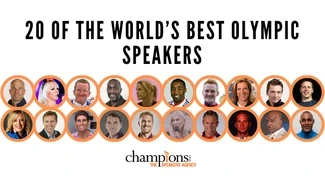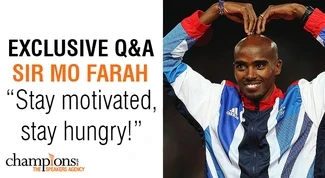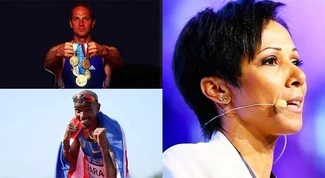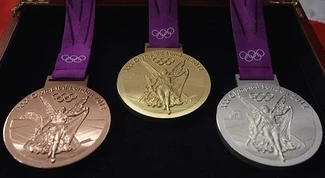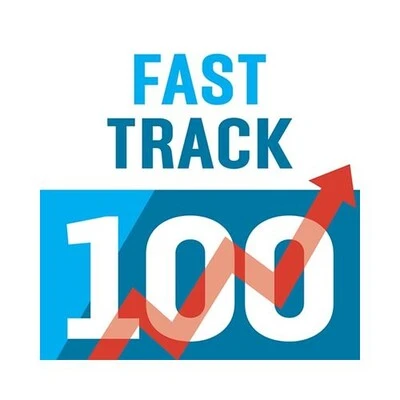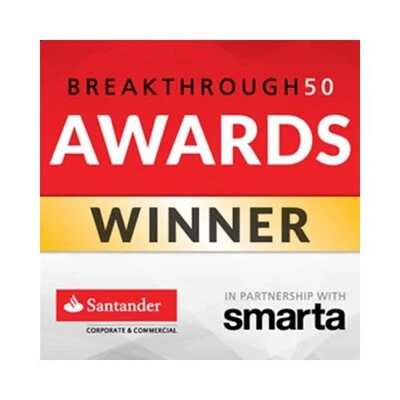To celebrate the 2021 Tokyo Olympic Games, we wanted to pay homage to the legends that will forever be remembered in the history books. These athletes are more than runners or swimmers, they are legendary figures who defied expectations to set the standard of competing. Stand-out talents, these inspiring individuals aren’t considered legends just because they won gold medals, it is their insatiable hunger for self-improvement that sets them apart from other competitors.
Legendary Olympic speakers translate this mindset for audiences of all backgrounds and industries. When booked for corporate audiences, these speakers provide actionable strategies for professional development, like valuing marginal gains and setting challenging goals. Having thrived in the face of competition, Olympic speakers provide a rulebook for succeeding in a hyper-competitive, fast-paced and pressurised market.
OVERCOME HURDLES
Olympic athletes possess incredible talent, but how do they differ from Olympic legends? Well, there isn't an exact diet or fitness regime that makes them unstoppable. Legends are born in those moments when the impossible becomes possible, those moments when we are faced with a mountainous challenge – then overcome it.
Mental resilience is not built on the podium, but in the lowest moments of an athlete’s career. When they are up against the wall, whether they choose to continue fighting sets the trajectory of their life on the track or in the pool. Overcoming hurdles is an essential skill for legendary Olympians - it is not how hard you fall that defines you, but how well you pick yourself back up and continue competing.
COMPETE HARD, TRAIN HARDER
Olympians will train for years before they are granted the chance to compete, and in those few moments, everything they trained for is put to the test. The difference between legends and ordinary athletes is their ability to continue training through the cold winter months and moments of self-doubt. To become the greatest at any discipline, athletes must play hard, compete harder and train the hardest, setting themselves up for success with hours of preparation and productive rest.
However, it is not enough to just repeat the same motion over and over again, whether that be leaping over hurdles or the butterfly stroke. Not according to Sir Dave Brailsford. Creator of the marginal gains philosophy, he proposes that true sporting greatness comes from tailored training that celebrates 1% improvements and tackles personal weaknesses, leading to 100% success.
REALLY, REALLY WANT IT
A good athlete wants to win, a great athlete wants to win even more. In our interview with legendary track athlete Kriss Akabusi, he discussed what motivated him out of bed and into training every morning. In Kriss’ own words; “I knew that around the world somewhere, there’s somebody in your event who’s staying in bed. I’m one-up against him”. Read our full interview with the incredibly talented Kriss Akabusi, and discover more of his secrets for Olympic success.
Olympic legends dedicate their life to their sport, they live, eat and breathe the thrill of passing the finish line in first place. This hunger for success, combined with their bespoke training regime, separates these legendary athletes from their opponents - who chose to stay in bed instead of getting up for training. Giving 100% of your mind, body and soul, puts you firmly on track to legendary status.
How These Olympic Speakers Become Sporting Legends
Discover how these Olympic icons grew from humble athletes to sporting legends:
STEVE REDGRAVE
Steve Redgrave is a rowing legend. Having competed in the Olympics at five consecutive games, he dedicated his life to the sport – and it paid off. He goes down as an Olympic legend due to the ferocious and explosive power he put into each oar stroke, which is why he is still the only man in history to have won five gold medals in an endurance sport. Steve’s journey to Olympic prominence was paved with determination, perseverance and a hunger for success.
MO FARAH
Sir Mo Farah is undoubtedly one of the greatest distance runners in Olympic history. Mo decimated his opponents in the 5000 metres and 10,000 metres, claiming a gold medal at the 2016 Rio Olympic Games, and the 2012 London Olympic Games. If Usain Bolt is the quickest man alive, Mo is the best endurance runner ever to set foot on the track. His legendary status is credited to Mo’s discipline, which included training in high altitudes during winter to strengthen his form and build his endurance.
USAIN BOLT
Dubbed the fastest man in the world, Jamaican sprinter Usain Bolt holds the fastest track record time in both the 100 metre and 200-metre sprints. With a world track record of 9.72 seconds, he is often described as faster than lightning. Holding gold medals for every Olympic event he has competed in, no one could keep up with his explosive speed. Usain proves that with determination, training and self-belief, even the most impressive of records can still be beaten.
DAME KELLY HOLMES
Honorary Colonel Dame Kelly Holmes is a multiple gold medalist, who shone at the 2004 Athens Olympic Games. Clinching first place in both the 800 metres and 1,500 metres, she showed an exceptional level of determination in the gruelling races, a testament to Kelly’s form and commitment to her training regime. Widely considered to be one of Team GB’s greatest Olympic athletes, her legendary status is credited to Kelly’s steely grit and perseverance.
MICHAEL PHELPS
Known by his nicknames 'The Flying Fish' and 'Baltimore Bullet', Michael Phelps is the most decorated Olympian of all time. After winning a record-breaking 23 gold medals and 28 Olympic medals overall, he is beyond a doubt one of the greatest Olympic legends ever to exist. When he reflects upon his career, Michael attributes his success to his team of trainers, managers and physiotherapists, highlighting the importance of high-performance teams.
Book an Olympic Speaker
To book an Olympic speaker, simply contact our team of booking agents today on 0207 1010 553 or fill out our online contact form.
